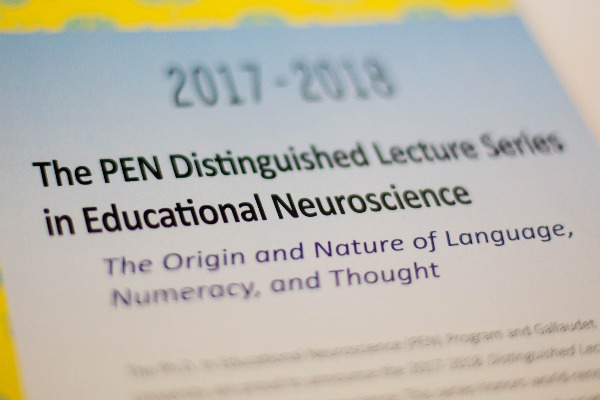PEN Distinguished Lecture Series
The PEN Distinguished Lecture Series in Educational Neuroscience was created in association with the Foundations Proseminar course for graduate students in the Ph.D. in Educational Neuroscience (PEN) program. Since its inception, the series has grown!
The lecture series focuses on the intersection of the Science of Learning (learning across the lifespan) and Educational Neuroscience (learning across early life). Scientists and researchers who are pioneers in the fields of Cognitive-Educational Neuroscience, Developmental Cognitive Neuroscience, and Child Development come to Gallaudet University's campus to talk about their research.
Register for Upcoming Lectures
All lectures are open to the public and are video recorded for online distribution.
PEN DLS brochure for 2024-2025
Number Symbols in the Brain and Mind

Humans share with animals the ability to process numerical quantities in non-symbolic formats (e.g. collections of objects). Unlike other species, however, over cultural history, humans have developed symbolic representations (such as number words and digits) to represent numerical quantities exactly and abstractly. These symbols and their semantic referents form the foundations for higher-level numerical and mathematical skills. It is commonly assumed that symbols for number acquire their meaning by being mapped onto the pre-existing, phylogenetically ancient system for the approximate representation of non-symbolic number over the course of learning and development. In this presentation, I will challenge this hypothesis for how numerical symbols acquire their meanings (‘the symbol grounding problem’). To do so, I will present a series of behavioral and neuroimaging studies with both children and adults that demonstrate that symbolic and non-symbolic processing of number is dissociated at both the behavioral and brain levels of analysis. I will discuss the implications of these data for theories of the origins of numerical symbol processing and its breakdown in children with mathematical learning disorders, such as Developmental Dyscalculia.
Leadership in Educational Neuroscience
Dr. Ansari is a Full Professor and Canada Research Chair in Developmental Cognitive Neuroscience in the Department of Psychology and the Brain and Mind Institute at the University of Western Ontario in Canada and heads The Numerical Cognition Laboratory (www.numericalcognition.org). In 2002, as a new PhD from the United Kingdom, Dr. Ansari was invited to join an initiative at Dartmouth College in Hanover, N.H., USA, involving the creation of a new department, the first of its kind in the United States for undergraduates, the Department of Educational Neuroscience and Human Development, Chaired by Laura-Ann Petitto. As the department's first hire, Assistant Professor Ansari joined with colleagues to advance fundamentally the discipline of Educational Neuroscience with his pioneering research on math and numeracy in children, its development in the human brain, and the translational implications of this important knowledge for education and teachers, and for children's learning of math and numeracy in early life. He has written very influential papers about the discipline, and, presently, he has risen to the president-elect of the International Mind, Brain, and Education Society, aka Educational Neuroscience. Dr. Ansari is the recipient of the Early Career Contributions Award from the Society for Research in Child Development, and the Boyd McCandless Early Researcher Award from the Developmental Psychology Division of the American Psychological Association.
